2 Volumes
Tourist Walk in Olde Philadelphia
You've seen the Liberty Bell and Independence Hall.
Come now on a tour of the city the Founding Brothers lived in, a smaller city than today which they knew intimately. Their Colonial Philadelphia can be seen in a day's walk through the center of town.
Regional Overview: The Sights of the City, Loosely Defined
Philadelphia,defined here as the Quaker region of three formerly Quaker states, contains an astonishing number of interesting places to visit. Three centuries of history leave their marks everywhere. Begin by understanding that William Penn was the largest private landholder in history, and he owned all of it.
Up Market Street
to Sixth and Walnut
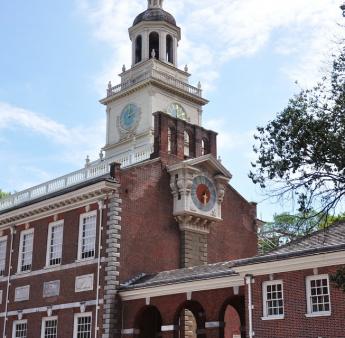 Millions of eye patients have been asked to read the passage from Franklin's autobiography, "I walked up Market Street, etc." which is commonly printed on eye-test cards. Here's your chance to do it.
Millions of eye patients have been asked to read the passage from Franklin's autobiography, "I walked up Market Street, etc." which is commonly printed on eye-test cards. Here's your chance to do it.

Emerge from Christ Church onto Market Street, crossing to the Southside. Between Third and Fourth Streets (318 Market), there is a row of Eighteenth-Century Houses, commissioned by Benjamin Franklin, with a central archway leading to the interior of the block where he placed his own house. The restorationists have cleverly displayed the skeleton of the rafters of the house. When the British occupied Philadelphia in 1788, Major Andre (later to become Benedict Arnold's spy-handler) insolently took over Franklin's own house as his headquarters (General Howe took over Robert Morris's much more splendid house further up Market Street between Fifth and Sixth.) John Andre sort of played the role of a court jester for the British officers. He was a poet, playwright, wit, and dashing life of every party. Washington was in tears when he ordered his hanging for involvement in the defection of Benedict Arnold at West Point.
Continue on and out the South end of Franklin Court, onto Chestnut Street, after you have visited the Museum of Ben Franklin, aimed at children but containing examples of his many inventions, a theater with interesting short presentations, and a fascinating sound and light show of Franklin's great moments. The somewhat unexpected underground building is a product of the famous architect, Frank Venturi. This ingenious museum proved hard to find, and there are plans afoot to remake it. At the corner of 3rd and Chestnut (where a restaurant now stands) once stood the house of Alexander Hamilton, and a few houses further North on 3rd Street retains the dilapidated remnant of the business of Anthony Drexel, the mentor and later senior partner to J.P. Morgan. Turning about and looking south, you can see the reason for this concentration of financiers. Just south of Chestnut is the First Bank of the United States (the fascinating Museum of Old House Parts once was on the second floor), while the two blocks of Chestnut Street -- Third to Fifth Streets -- are filled with the massive stone piles of other banks of Philadelphia, culminating in that Parthenon-appearing Second Bank, Nicholas Biddle's bank. In the forty years before Andrew Jackson and Martin van Buren interfered, it wasn't Wall Street that mattered. It was Chestnut Street.
Proceed westward on Chestnut Street, and pass the converted bank now used by the Chemical Heritage Foundation, followed by another bank used by the American Philosophical Society as an auditorium. (In those days, Philosophical meant "scientific") On the other side of the street, an alley leads southward to Carpenters Hall, where the First Continental Congress held deliberations. At that time, it was the largest private building in the Colonies.
Continuing to Fifth and Chestnut, you may wish to take a detour south to around Sixth and Pine to see the mansions of Society Hill, particularly the Powell House and the Physick House. Intermingled with the red-brick Georgian style are examples of classical style reflecting French influence. Our present tour, however, points you to the red brick building just to the south of Independence Hall on Fifth Street. It looks like part of the State House complex but is actually the home of the American Philosophical Society, now housing its fascinating museum (seen only by appointment). After that, by all means, stand in line and take the National Parks tour of Independence Hall, which is one of the best displays in the whole Park Service. After that, the tour of the Liberty Bell on the north side of Chestnut is just a trifle tame, but a mandatory visit.
Do not neglect to cross Sixth Street to the Curtis Building, where a few steps inside is the astonishing mosaic constructed by Louis Comfort Tiffany out of Tiffany glass, based on the artistry of Philadelphian Maxfield Parrish. Look around the lobby, which is pretty ornate, but it once held printing presses for the Saturday Evening Post.
Emerge from the Curtis Building on the Seventh Street side. Take a look at the Atwater Kent Museum of the City of Philadelphia, then notice the Jeweler's Row on Samson Street. The house where Thomas Jefferson wrote the Declaration of Independence is at the corner of 7th and Market; it's a reproduction, however. This would bring you back to the subways and high-speed line where the tour began. Instead, the full tour goes back to the Curtis Building and heads south.
Venturi's Franklin Museum in Franklin Court
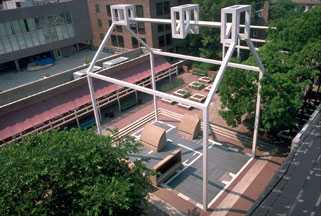
|
| Franklin Court Museum |
When Judge Edwin O. Lewis was seized with the idea of making a national monument out of Colonial Philadelphia, he wanted it big. Forty or so years later, it's big all right, but not big enough to encompass the whole of America's most historic square mile. Government ownership in the form of a cross now extends five blocks north from Washington Square to Franklin Square, and four blocks East from Sixth to Second Streets. Restoration and historic display have spread considerably beyond that cross, however, and the Park Service has created ingenious walkways within the working city in the neighborhood. If you thread your way through these walkways, you can stroll for miles within the world of William Penn and Benjamin Franklin. One such unexpected walkway is now called Franklin Court, which essentially cuts from Market to Chestnut Streets, within the block bounded by 3rd and 4th Streets. Hidden in the center is the reconstructed ghost of Franklin's quite large house, sitting in an interior courtyard bounded by a colonial post office, and a newspaper office once operated by Franklin's grandson. And, along the side of the walkway near Chestnut Street, is a fascinating museum of Franklin's personal life, built by no less than Frank Venturi, and operated by Park Rangers in the polished but low-key manner for which the U.S. Park Service is famous.
For some reason, this jewel of a museum has not received the high-powered publicity it deserves. It's off the main Park premises, as we mentioned, and some of the problem has to be attributed to Venturi. As you walk through, you don't expect a huge museum to be there, and it can look pretty inconspicuous as you walk past because it is mostly underground. Take my word for it, it's worth a visit. There are long descending ramps inside the doors, which can be pretty daunting if you are elderly and tired. But, also inconspicuous, there's an elevator if you look around for it. Venturi didn't seem to like windows very much, which is a problem for some people.
There's a movie theater inside there, playing a long list of fascinating documentaries. There's an ingenious automated display of statuettes which utilize spotlights and revolving stages to present Franklin in Parliament, resisting the Stamp Act, Franklin being his charming self before the French monarchs, and the frail dying Franklin getting the Constitutional Convention to approve the document. There are also a variety of ingenious inventions of Franklin's on display in the original, including bifocal glasses, the first storage battery, a simplified clock, several library devices, the Franklin stove, and so on. In some ways, the highlight is the Armonica.
The Armonica is the musical instrument invented by Franklin, for which both Beethoven and Mozart composed special music to exploit its haunting tone. If you ask the nice Park Ranger, she will be flattered to play you a tune on it.
Armonica, Momentarily Mesmerizing
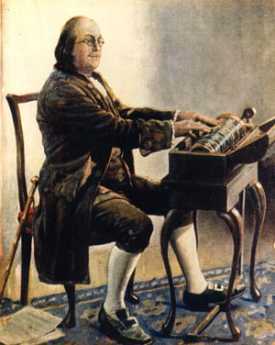
|
| Ben Franklin's Glass Armonica |
Everyone knows Ben Franklin spent a lot of time holding a wine glass. Evidently, he noticed a musical note emerges if you run your finger around the open mouth of the drinking glass, and systematically studied how the tone can be varied by varying the level of liquid in the glass. The same variation in emitted tone relates to variations in the thickness of the glass. So, he set up a series of different sized glasses impaled on a horizontal broomstick, enough to cover three octaves, rotated the broomstick with a treadle like those used for spinning wheels -- and made music. The tone has a haunting penetration to it, which induced both Beethoven and Mozart to write special compositions for the harmonica, and the Eighteenth Century went wild with enthusiasm.
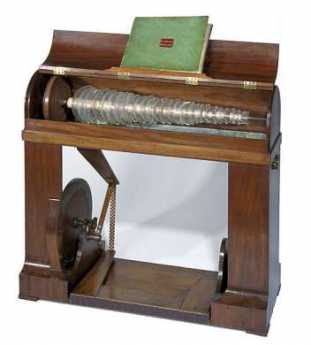
|
| Glass Armonica |
Unfortunately, a number of the young ladies who played the armonica went mad. We now recognize that since the finest crystal glass was used, with very high lead content, the mad ladies were suffering from lead poisoning after repeatedly wetting their fingers on their tongues. As a matter of fact, port wine at that time was stored in lead-lined casks, resulting in the same unfortunate consequences, which included stirring up attacks of gout. Franklin himself was a famous sufferer from gout, which was more likely related to the port wine than playing the harmonica, in his particular case.
Anyway, the reputation for inducing madness added to the spooky sort of sound the instrument made, attracting the attention of a montebank named Franz Anton Mesmer, who falsely claimed to be the father of hypnotism. Mesmer enhanced the society of his stage performances by hypnotizing subjects while an assistant played the harmonica, meanwhile relating all sorts of wild tales about animal magnetism. This was pretty sensational at the time until a young man in an audience suddenly died. It is now speculated that the victim probably had an epileptic seizure, but the news of this public fatal event pretty well finished Mesmer as an evangelist and the harmonica as a musical instrument.
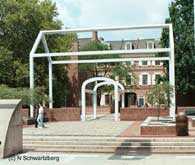
|
| Franklin Court |
There's a replica of an armonica on display in the Franklin Court Museum around 3rd and Chestnut, which we are vigorously assured is not made with leaded crystal glass. The Park Rangers put on two daily performances by request, at noon, and 2:30 PM.
Joseph Priestley, Shaker and Mover
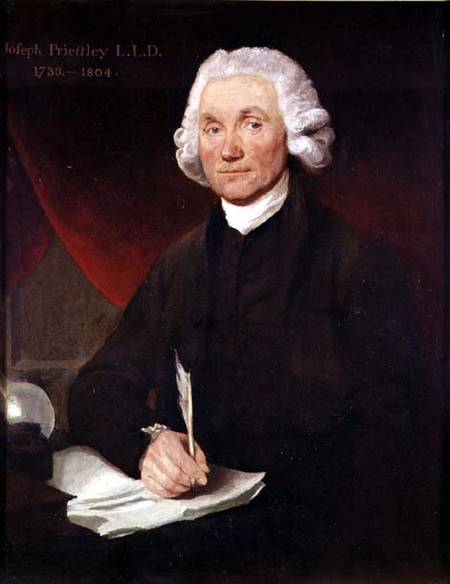
|
| Priestley |
Joseph Priestley, sometimes also spelled Priestly, is surely one of the more undeservedly neglected men of history. He has been called, with justice, the Father of the Science of Chemistry. He might also be called with equal justice, the father of the First Unitarian Church . The First Unitarian Church of Philadelphia, at 21st and Walnut, is the first and oldest Unitarian church and was indeed started at the urging of Priestley, whose principal residence was in Northumberland PA, at the confluence of the West and North Branches of the Susquehanna. Priestly wrote a scholarly work on the teachings of Jesus, which so captivated Thomas Jefferson that Jefferson wrote him the outline of another book that needed writing. Apparently, Priestley didn't have time, so in 1803 Jefferson wrote it himself, in the four languages he was fluent in, English, French, Latin, and Greek. Although those were simpler times, there have been few if any others who have told a President of the United States that he was just too busy to respond to a presidential request, particularly when the President could then find he had time to do it himself.
Priestley's theological teachings were based on scientific reasoning. They were highly controversial views, to say the least. He rejected the concept of a Trinity (he was a Calvinist minister, mind you), the divinity of Christ, and the immortality of the soul. Essentially, he rejected the concept of an immortal soul on the reasoning that perceptions and thought were functions of material structures in the human brain (Edmund O. Wilson's idea of Consilience is largely similar), and therefore will not outlive the cerebral tissue which produced them. In 1791, mobs burned his house in Birmingham, England, his patronage was revoked, and he hastily emigrated to Philadelphia. It isn't hard to see why these ideas were particularly unpopular with the Anglican church, which is probably the main reason England made him into a non-person, and his scientific ideas were denigrated as the product of other people.
That's too bad because he really was a scientist of immense importance. As a young man, he encountered Benjamin Franklin in England and was certainly a man after Franklin's heart. He noticed funny things about gases that rose from swamps and over mercury salts, and Franklin encouraged him to systematize and analyze his observations into theory. Although he called it anti-phlogiston, he had discovered oxygen. And then hydrogen, and nitrous oxide, and sulfur dioxide, and hydrochloric acid. Priestley really was the first organized and coherent scientific chemist, the Father of Chemistry. Franklin, Lavoisier, and Priestley became scientific friends, and enthusiastically exchanged ideas and observations, eventually leading to Lavoisier's fundamental principle: Matter is neither created nor destroyed, it only changes its form. In the end, it made no difference; Priestly had offended some pretty large religions, and nothing he did in chemistry was going to get much attention. Perceiving the value of the land at the confluence of rivers, he made his home for the last ten years of his life in Northumberland, Pennsylvania, now three hours drive Northwest, somehow managing to maintain an active scientific, political and theological influence worldwide. Visiting this rather sumptuous estate in a little river town is well worth a tourist visit. He died in 1804, just after his friend and kindred-religionist Thomas Jefferson became President of the United States.
Priestley's life can be summarized in one of his own most quoted remarks. "In completing one discovery we never fail to get an imperfect knowledge of others of which we could have no idea before so that we cannot solve one doubt without creating several new ones."
REFERENCES
| The Invention of Air: A Story of Science, Faith, Revolution,and The Birth of America, Steven Johnson ISBN: 978-1-59448-852-8 | Amazon |
Carpenters Hall
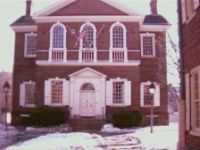
|
| Carpenters Hall |
The birthplace of our nation is both smaller than you would expect and larger. The fire marshall now says no more than 83 people may rent it for a sit-down affair, or 103 for a stand-up gathering. However, the internal partitions have been removed from what was once a center-hall building with a meeting room on either side; it now is a large open room in the form of a Greek cross. At the time of the revolution, Benjamin Franklin's Library Company occupied the second floor, so the First Continental Congress had to find a way to do its work in the side rooms of the first floor, to the side of the center hall. There were 53 delegates, and presumably some staff and visitors.
That sounds rather crowded, but it was nevertheless the largest rentable public space in the city. John Adams arrived early for the convention, conniving with several other early arrivals at the City Tavern. Adams made the following notation in his diary: Monday. At ten the delegates all met at the City Tavern and walked to the Carpenters' Hall, where they took a view of the room, and of the chamber where is an excellent library; there is also a long entry where gentlemen may walk, and a convenient chamber opposite to the library. The general cry was, that this was a good room, and the question was put, whether we were satisfied with this room? and it passed in the affirmative." Alternative places to meet would have been in churches, which presented awkwardness, or in the State House (Independence Hall) which was then under the control of Tories.
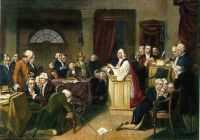
|
| Continental Congress |
France and the rebellious colonies was a complicated one, with intrigue and mistrust at every turn. One interesting episode had to do with Franklin's library on the second floor. The French ministry had sent over a spy, to size up the colonists before the French risked too much on them. So, the spy was led up to the library and allowed to overhear some bellicose conversations going on downstairs -- thoroughly stage-managed for the benefit of the "hidden" French visitor.
The Carpenters Company was a guild of what we would now call builders and architects, and architects continue to use it. The first floor usually displays a few Windsor chairs dating to the Continental Congress, covered with a rich black patina that really lets you know what a patina was. Upstairs, the staff quarters are now, well, a little on the elegant side so you can't visit. The guild was formed in 1724, and fifty years later had just completed its building, in time for its historic role in 1774.
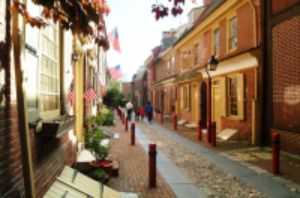
|
| Elfreth's Alley |
With the whole continent available for building, it is still not entirely clear why Colonial Philadelphia crowded itself into half a square mile, with crowded little row houses on crowded little alleys. But that's the way it was, now visible in the location of Carpenters' Hall down a little cobbled alley, in the center of a block. Elfreth's Alley gives you the same feeling, and perhaps Camac, Mole, and Latimer Streets. Carpenters' is a lovely little place, with lots of interesting features, but the main interest lies in what took place there. For that, you have to read a few books.
American Philosophical Society
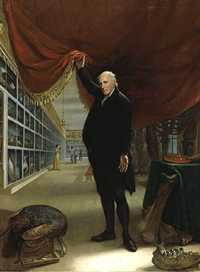
|
|
Charles Wilson Peale (1741-1827)
The Artist in His Museum 1822, Oil on canvas (The Joseph Harrison Jr. Collection) Courtesy of the Pennsylvania Academy of Fine Arts. |
all of the red brick buildings on Independence Square look as though they were part of Independence Hall, but there is one exception. The building facing Fifth Street is Philosophical Hall, one of the four buildings of the American Philosophical Society. Right now, Philosophical Hall is used as a museum. It could be called the first museum in America, but not the oldest, because it had interruptions and different proprietorships. Charles Wilson Peale started his museum of curiosities there and then moved it to the second floor of Independence Hall, where he painted the famous portrait of himself holding up the curtain. In recent years, Philosophical Hall has again become a museum, holding treasures and curiosities belonging to the Philosophical Society itself. The docent is pleased to alternate between calling it America's new oldest museum, and America's oldest new museum. And, yes, the newell post has an Amity Button.

|
|
American Philosophical Society |
Patents were established by the Constitution when it was a piece of parchment lying on a table fifty feet away from here, and the early patent office required the submission of a working model of every application for patent. After a while, that got to be a lot of working models lying around, and many of the more interesting ones are on display in the museum. Like the model of Fitch's first steamboat or the gadget Jefferson used, to make simultaneous copies of documents he was writing. That's right near the Gilbert Stuart copy of Washington's portrait, and von Neumann's first algorithm to be stored in his stored program machine, or computer, and Neil Armstrong's speech on the moon, concerning one step for mankind and all. It's a splendid museum, full of the real stuff, in a handsome Georgian building with sparkling immaculate marble staircases.

|
|
John Fitch received a US Patent for the Steamboat August 26, 1791 |
In the Eighteenth Century, Natural Philosophy was what we now call science. That's why PhDs get a degree of Doctor of Philosophy when they study chemistry and physics. The idea for forming a scientific society in America apparently originated with John Bartram. As so often happens, the originator couldn't quite get it established and had to call on Ben Franklin that impression of publicity, to get it off the ground. To be fair about it, Franklin was probably the more distinguished scientist of the two. To be even more fair about it, the organization struggled a bit until Thomas Jefferson (that's the one who was President of the United States) gave it a real publicity shove. During the depths of the 1930s depression, one of the members left it several million dollars with the stipulation that the investments should focus on common stock. Since buying stock in 1935 was widely regarded as about the stupidest thing an investor could do, this little episode reinforced a strong impression that membership in the APS is given to people who are very smart, not merely famous. The four buildings, the many fellowships, and the big endowment were largely made possible by this contraries investment decision.
There are eight hundred members, of whom 93 have won Nobel Prizes. Over the years, two hundred members have been awarded Nobel Prizes, but you must remember that the organization existed for 150 years before there was such a prize. Several U.S. Supreme Court justices are members and lots and lots of people who are famous. The docent comments that they look pretty much like everyone else. There's a rumor that Bill Gates turned down the offer of membership, so now we will just see. He's young enough to have several decades' opportunity to reconsider an offer, although the APS might just be old enough to lack interest in any second chances.
Franklin Declares Independence a Year Early
Joseph Priestly became a close friend of Benjamin Franklin almost as soon as they met. Priestly was an Anglican clergyman who broke loose and formed the Unitarian Church, and meanwhile, his scientific discoveries also entitle him to be called the Father of Chemistry. Franklin, of course, was the discoverer of electricity; it would be hard to be sure which of the two was more brilliant. In July, 1775, Franklin wrote the following letter to Priestly, which makes a trenchant case that the American colonies should, and would, break away from England. Since some legal authorities, following Lincoln's lead, maintain that Jefferson's manifesto "informs" the United States Constitution, it might be well to begin referring to this letter as an even clearer statement of the mindset of America's founding leaders.
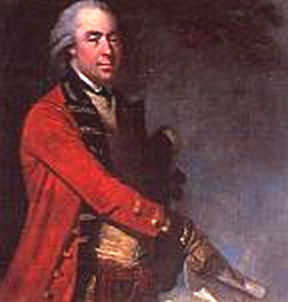
|
| General Thomas Gage |
" Dear Friend (wrote Franklin),
"The Congress met at a time when all minds were so exasperated by the perfidy of General Gage, and his attack on the country people (i.e. Of Lexington and Concord), that propositions of attempting an accommodation were not much relished; and it has been with difficulty that we have carried another humble petition to the crown, to give Britain one more chance, one opportunity more of recovering the friendship of the colonies; which however I think she has not sense enough to embrace, and so I conclude she has lost them forever.
"She has begun to burn our seaport towns; secure, I suppose, that we shall never be able to return the outrage in kind. She may doubtless destroy them all; but if she wishes to recover our commerce, are these the probable means? She must certainly be distracted; for no tradesman out of Bedlam ever thought of increasing the number of his customers by knocking them on the head; or of enabling them to pay their debts by burning their houses.
"If she wishes to have us subjects and that we should submit to her as our compound sovereign, she is now giving us such miserable specimens of her government, that we shall ever detest and avoid it, as a complication of robbery, murder, famine, fire, and pestilence.
"You will have heard before this reaches you, of the treacherous conduct to the remaining people in Boston, in detaining their goods, after stipulating to let them go out with their effects; on pretence that merchants goods were not effects; -- the defeat of a great body of his troops by the country people at Lexington; some other small advantages gained in skirmishes with their troops; and the action at Bunker's-hill, in which they were twice repulsed, and the third time gained a dear victory. Enough has happened, one would think, to convince your ministers that the Americans will fight and that this is a harder nut to crack than they imagined.
"We have not yet applied to any foreign power for assistance; nor offered our commerce for their friendship. Perhaps we never may: Yet it is natural to think of it if we are pressed.
"We have now an army on our establishment which still holds yours besieged.
"My time was never more fully employed. In the morning at 6, I am at the committee of safety, appointed by the assembly to put the province in a state of defense; which committee holds till near 9, when I am at the Congress, and that sits till after 4 in the afternoon. Both these bodies proceed with the greatest unanimity, and their meetings are well attended. It will scarce be credited in Britain that men can be as diligent with us from zeal for the public good, as with you for thousands per annum. -- Such is the difference between uncorrupted new states and corrupted old ones.
"Great frugality and great industry now become fashionable here: Gentlemen who used to entertain with two or three courses, pride themselves now in treating with simple beef and pudding. By these means, and the stoppage of our consumptive trade with Britain, we shall be better able to pay our voluntary taxes for the support of our troops. Our savings in the article of trade amount to near five million sterling per annum.
"I shall communicate your letter to Mr. Winthrop, but the camp is at Cambridge, and he has as little leisure for philosophy as myself. * * * Believe me ever, with sincere esteem, my dear friend, Yours most affectionately."
[Philadelphia, 7th July, 1775.]
REFERENCES
| The Invention of Air: A Story of Science, Faith, Revolution,and The Birth of America, Steven Johnson ISBN: 978-1-59448-852-8 | Amazon |
What Happened in Philadelphia on July 4, 1776?
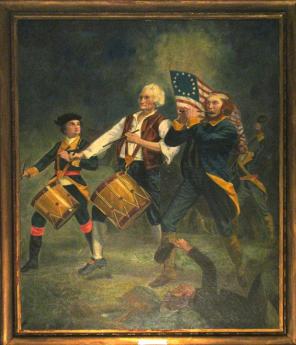
|
| Spirit of 76' |
The American colonies were growing too big, too fast, and the British Empire had too many international distractions, to have smooth relationships across three thousand miles of ocean, using uncertain communications available in the late Eighteenth century. Friction and misunderstanding were inevitable without far more statesmanship than either side thought was necessary. So, when the Continental Congress dispatched George Washington to Boston with troops to defend rebellious Massachusetts at Lexington, Concord, and Bunker Hill, it was hard for the British to believe the colonists were merely helping out one of their distressed neighbors. It seemed in London that the thirteen colonies had united, formed not only an army but a government, and gone to war. In December 1775 England passed the Prohibitory Act, essentially declaring war, and organized a huge invasion fleet to put down the rebellion. It now seems hard to understand the first notice the Americans had of this huge over-reaction was a private letter to Robert Morris from one of his agents in March 1776; no warnings, no negotiations, no attempt to investigate problems and correct them. The British just sent a fleet to settle this problem, whatever it was. It's all very well to say the Americans should have known they were playing with fire. They didn't see it that way; they were being self-reliant, responding to attack. In June 1776 British patrol frigates were skirmishing in the Delaware River; late in the month, British troops landed on Staten Island. The American reaction to all this was a muddle of confusion. A few were delighted, most of the rest were amazed or appalled.
Although the deeper strategic origins of the American Revolution are subtle, complex, and controversial, there is far less muddle about what happened on July 2, 1776, publicly proclaimed two days later. Adopting a resolution written by Richard Henry Lee of Virginia, the Thirteen Colonies stated they had now clarified their goals in the controversy with the British monarchy. For a year before that, the Continental Congress had been corresponding with each other and meeting in Carpenters Hall with the goal of achieving representation in the British parliament -- "No taxation without representation". The model for most of them was based on the Whig agitation for Ireland -- for a local parliament within a larger commonwealth. But the passing of the British Navy in Halifax, Nova Scotia, and then the actual appearance of seven hundred British warships in American waters showed that not only was Parliamentary representation out of the question, but King George III was going to play rough with upstarts. The new goal was no longer just representation, it was independence. If we were going to resist a military occupation at the risk of being hanged as traitors, we might as well do it for something substantial. The meeting had a number of Scotch-Irish Princeton graduates, whose basic loyalty to England had long been divided. Pacifist Pennsylvania, chief among the wavering hold-outs, was mostly won over by its own Benjamin Franklin, who was optimistic the French would help us. Even so, both Robert Morris and John Dickinson refused to sign the Declaration; Franklin persuaded both to abstain by absence, which created a majority of the Pennsylvania delegation in favor. That's a pretty slim majority for a crucial decision. Franklin was soon dispatched back to Paris to make an alliance; Washington was dispatched to hold off that British army in the meantime. Jefferson was designated to write a proclamation, which even after editing is still pretty unreadable beyond the first couple of sentences. Meeting adjourned. This brief account may not qualify as a serious examination of the causes of the American Revolution, but it comes close to the way it seemed to the colonist in the street.
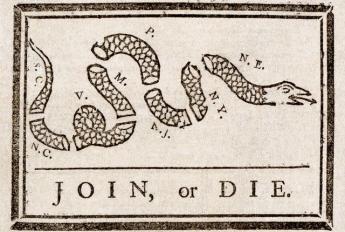
|
| Colonist's Complaint |
The rebels then spent eight years convincing the British they were serious and have been independent ever since. But, just a minute, here. Reflect on the fact that fighting had been going on for a year in Massachusetts, and that Lord Howe's fleet had set sail a month before the Declaration, actually landing on Staten Island at just about the same time as the Fourth of July. Add the fact that only John Hancock actually signed the document on July 4th, and some of the signers even waited until September. You can sort of see why John Adams never got over the idea that Thomas Jefferson had a big nerve implying the whole Revolution was his idea. What's more, there's a viewpoint that New England subsequently had to endure a President from Virginia for thirty-two of the first thirty-six years of the new nation because loud talk from New England still made the rest of the country nervous. Philadelphia may have been the cradle of Independence, but that was not because it was a colony hot for war, dragging others along with it. Rather, it was the largest city in the colonies, centrally located. It had a strong pacifist tradition, and it had the most to lose from a pillaging enemy war machine. When Independence was finally declared the goal, many of Philadelphia's leading citizens moved to Canada.
New England had started hostilities and was about to be subdued by overwhelming force. The Canadians were not going to come to their aid, because they were French, and Catholic, and enough said. What New England and the Scotch-Irish needed were WASP allies, stretching for two thousand miles to the South. By far the largest colony was Virginia, which included what is now Kentucky and West Virginia; it even had some legal claims for vastly larger territory. Virginia was incensed about its powerlessness against British mercantilism, especially the tobacco trade. The rest of the English colonies had plenty of assorted grievances against George III, and almost all of them could see that America was rapidly outgrowing dependency on the British homeland, without a sign that Parliament was ever going to surrender home rule to them. It was perhaps unfortunate New Englanders were so impulsive, but it looked as though a military confrontation with the Crown was inevitably coming. Without support, New England was likely to be torched, as Rome once subdued Carthage.
And the last hope for an alternative of flattery and diplomacy, for guile and subtlety, had stepped off the boat a year earlier. Benjamin Franklin, our fabulous man in London, arrived with the news he had finally had it "up to here" with the British ministry. He was a man who quietly made things happen, carefully selecting his arguments from amongst many he had in mind. In retrospect, we can see that he held the idea of Anglo-Saxon world domination as far back as the Albany Conference of 1745, and could even look forward to America outgrowing England in the 19th Century. His behavior at the Constitutional Convention of 1787 strongly suggests he never completely gave up that long-term dream. Just as Edmund Burke never gave up the idea of Reconciliation with the Colonies, Benjamin Franklin never quite gave up the idea of Reconciliation with England. While John Dickinson and Robert Morris resisted the idea of Independence down to the last moment, Franklin took a much longer view. For the time being, it was necessary to defeat the British, and for that, we needed the help of the French. In 1750, America joined with the British to toss out the French. And then in 1776, we joined the French to toss out the British. Franklin didn't always get his way. But Franklin was always steering the ship.
After the Convention:Hamilton and Madison
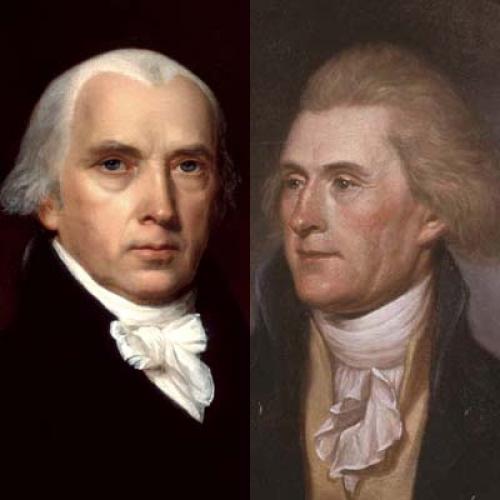
|
| Signers |
The Federalist Papers were written by three founding fathers after the Constitution had been completed and adopted by the Convention. Detecting hesitation in New York, the aim was for publication in New York newspapers to persuade that wavering State to ratify the proposal. It is natural that The Federalist was composed of arguments most persuasive to New York, putting less stress on matters of concern to other national regions. This narrow focus may explain the close cooperation of Hamilton and Madison, who must surely have suppressed some latent concerns in order to present a unified position. In view of how much emphasis the courts have placed on the original intent of almost every word in the Constitution, it seems a pity that no one has attempted to reconcile the words of the principal explanatory documents with the hostile disagreements of their two main authors, almost as soon as the Constitution came into action. Perhaps the psychological hangups would be more convincingly dissected by playwrights and poets, than historians.
John Jay wrote five of the essays, mostly concerned with foreign relations; his presence here highlights the historical likelihood that Jay might have been the one who first voiced the idea of replacing the Articles of Confederation. At least, he seems to have been first to carry the idea of a general convention for that purpose to George Washington (in a March 1786 letter). The remaining essays of The Federalist were written under the pen name of Publius by Alexander Hamilton and James Madison, both of whom had a strong enough hand in crafting the Constitution, but who quickly became absolutely dominant figures in the two central political factions after the Constitution was actually in operation. And their eagerness to be central is itself telling. They were passing from a stage of pleasing George Washington with his favorite project, into furthering a platform for launching their own emerging agendas. It is true that Madison's Federalist essays were mainly concerned with relations between the several states, while Hamilton concentrated on the powers of the various branches of government. As matters evolved, Hamilton soon displayed a sharper focus on building a powerful nation; Madison scarcely looked beyond the strategies of internal political power except to see clearly that Hamilton was going to get in the way. These two areas are not necessarily incompatible. But it is nevertheless striking that two such relentlessly driven men could work together to achieve the same set of rules for the game they were about to play so unflinchingly. Thomas Jefferson had been in France during the Constitutional Convention. It was he who was most dissatisfied with the resulting concentration of power in the Executive Branch, but Madison eagerly became the most active agent for forming the anti-Federalist party, with all its hints that Washington was too senile to know the difference between a President and a King. Washington abruptly cut him off and never spoke to Madison after the drift of his opinions became undeniable. Today, it is common to slur politicians for pandering to lobbyists and special interests, but that presents only weak competition with the personal forces shaping leadership opinion, chief among them being loyalty to, and perceived disloyalty from, close political associates.
As a curious thing, both Hamilton and Madison were short and elfin, and both relied for influence heavily on their ability to influence the mind of
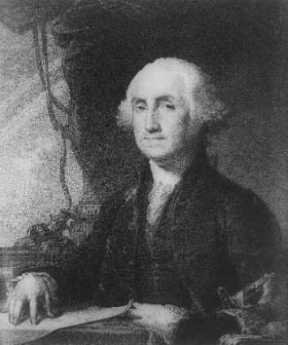
|
| George Washington |
George Washington, who projected the power and manner of a large formidable athlete. Washington had no strong inclination to run things and, once elected, no particular agenda except to preside in a way that would meet general approval. He had mainly wanted a new form of government so the country could defend itself, and pay its soldiers. Madison was a scholar of political history and a master manipulator of legislative bodies, while Hamilton's role was to supply practically unlimited administrative energy. Washington was good at positioning himself as the decider of everything important; somehow, everybody needed his approval. On the other hand, both Madison and Hamilton were immensely ambitious and needed Washington's approval. This system of puppy dogs bringing the Master a bone worked for a long while, and then it stopped working. Washington was very displeased.
The difference between these two short men immediately appeared in the way they chose a role to play. Madison the Virginian chose to dominate the legislative process as the leader of the largest state delegation within the

|
| Alexander Hamilton |
House of Representatives, in those days the dominant legislative chamber. Hamilton sought to be Secretary of the Treasury, in those days the largest and most powerful department of the executive branch. It's now a familiar pattern: one wanted to form policy through dominating the board of directors, while the manager wanted to run things his way, even if that led in a different direction. Both of them knew they were setting the pattern for the future, and each of them pushed his ideas as far as they would go. Essentially, this could go on until Washington roused himself.
After a short time in office, Hamilton wrote four historic papers about two general goals: a modern financial system, and a modern economy. For the first goal, he wanted a dominant national currency with mint to produce it and a bank to control it. Second, he also wanted the country to switch from an agricultural base to a manufacturing one. You could even say he really wanted only one thing, a national switch to manufacturing, with the necessary financial apparatus to support it. Essentially, Hamilton was the first influential American to recognize the power of the Industrial Revolution which began in England at much the same time as the American Revolution. Hamilton was swept up in dreams of its potential for America, and while puzzled -- as we continue to be today -- about some of its sources, became convinced that the secrets lay in the economic theories of
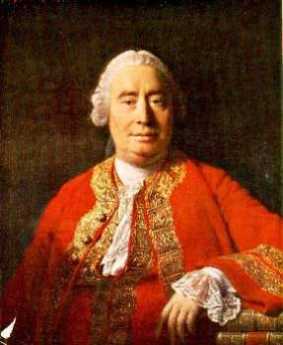
|
| David Hume |
David Hume and Adam Smith in Scotland, and of Necker in France. Impetuous Hamilton saw that Time was the essence of opportunity; we quickly needed to gather the war debts of the various states into the national treasury, we quickly needed a bank to hold them, and a mint to make more money quickly as liquidity was needed. It seemed childishly obvious to an impatient Hamilton that manufacturing had a larger profit margin than agricultural products did; it was obvious, absolutely obvious, that this approach would inspire huge wealth for the new nation.
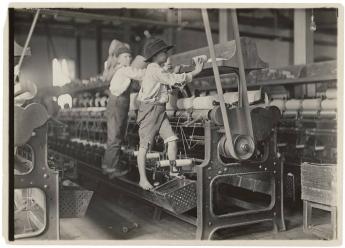
|
| Industrial Revolution |
Well, to someone like Madison who was incredulous that any gentleman would think manufacturing was a respectable way of life, what was truly obvious was that Hamilton must be grabbing control of the nation's money to put it all under his own control. He must want to be king; we had just got rid of kings. Furthermore, Hamilton was all over the place with schemes and deals; you can't trust such a person. In fact, it takes a schemer to know another schemer at sight, even when the nature of the scheme was unclear. Madison and Jefferson couldn't understand how anyone could look at the vast expanses of the open continent stretching to the Pacific without recognizing in this must lie the nation's true destiny. Why would you fiddle with pots and pans when with the same effort and daring you could rule a plantation and watch it bloom? If anyone had used modern business jargon like "Win, win strategy", the Virginian might well have snorted back, "When you say that to me, friend, smile."
Alexander Hamilton, Celebrity
 He had the kind of taudry private life and flashy public behavior that Philadelphia will only tolerate in aristocrats, sometimes. 
|
It comes as a surprise that most of the serious, important things Alexander Hamilton did for his country were done in Philadelphia, while he lived at 79 South 3rd Street. That surprises because much of his more colorful behavior took place elsewhere. He was born on a fly-speck Caribbean island, the "bastard brat of a Scots peddler" in John Adams' exaggerated view, was orphaned and had to support himself after age 13. The orphan then fought his way to Kings College (now Columbia University) in New York in spite of hoping to go to Princeton, and has been celebrated ever since by Columbia University as a son of New York. He did found the Bank of New York, and he did marry the daughter of a New York patroon, and he was the head of the New York political delegation. As you can see in the statuary collection at the Constitution Center, he was a funny-looking little elf with a long pointed nose, frequently calling attention to himself with hyperkinetic behavior. Even as the legitimate father of eight children, Hamilton had some overly close associations with other men's wives, probably including his wife's sister. Nevertheless, he earned the affection of the stiff and solemn General Washington, probably through a gift of gab and skill getting things done, while outwardly acting as court jester in a difficult and dangerous guerilla war. There is a famous story of his shaking loose from the headquarters staff and fighting in the line at Yorktown, where he insolently stood on the parapet before the British enemy troops, performing the manual of arms. Instead of using him for target practice, the British troops applauded his audacity. Harboring no such illusions, Aaron Burr later killed him in a duel as everyone knows; it was not his first such challenge.

|
| Alexander Hamilton |
Columbia University President Nicholas Murray Butler told other stories of celeb behavior to reinforce Hamilton's New York flavor. But in the clutch, General Washington learned he could always trust Hamilton, who wrote many of his letters for him and acted as his reliable spymaster. When the first President faced signing or not signing the fateful bill to create the National Bank, a perplexed Washington had to choose between: the violent opposition of Thomas Jefferson and James Madison, or the bewildering complexity of Alexander Hamilton's reasoning in arcane economics. On the one hand, there was the simple principle that owing money was seemingly always evil; on the other was the undeniable truth that for every debit created, you create a balancing credit somewhere. Washington ultimately chose to go with Hamilton, whose reasonings he likely didn't understand very well. If you doubt the difficulty, try reading Hamilton's Report on the Bank, written to persuade the nation and its first President of the soundness of his ideas. And then consider the violence of even present-day arguments about such "supply side" economics.
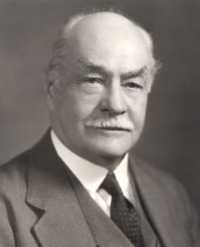
|
| Nicholas Murray Butler |
All of these momentous events happened in Philadelphia at places now easily visited in a morning's stroll. But Hamilton's image as a Philadelphian, doing great things in and for Philadelphia, was forever tarnished at one single dinner he hosted. Jefferson and Madison, his political opponents but his guests, were persuaded to provide Virginia's votes for the federal takeover of state Revolutionary War debts, in return for offering New York's votes for moving the nation's capital to the banks of the Potomac. True, Pennsylvania allowed itself to be pacified with having the capital remain here for ten years while the southern swamps were being drained. But it was Hamilton who cooked up this deal and sold it to the other vote swappers. Philadelphia felt it was entitled to the capital without needing to ask, felt that Hamilton was deliberately under-counting Pennsylvania's war debts, and this city has never appreciated the insolent idea that its entitlements were forever in the hands of wine-swilling hustlers. As the economic consequences of this backroom deal became evident during the 19th Century, it was increasingly unlikely that Philadelphia would lionize the memory of the man responsible for it. Let New York claim him, if it likes that sort of thing. When Albert Gallatin, who was more or less a Pennsylvania home town boy, attacked Hamilton as a person, as a banker, and as a Federalist -- he had a fairly easy time persuading Philadelphians that this needle-nosed philanderer was an embarrassment best forgotten.
REFERENCES
| Alexander Hamilton Ron Chernow ISBN:978-0-14-303475-9 | Amazon |
Andrew Hamilton (1676-1741)
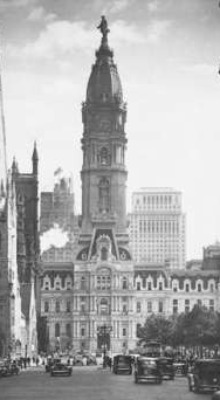
|
| Philadelphia City Hall |
An admirer of Philadelphia Reflections recently asked who is the most under-appreciated Philadelphian, and the quick answer would be William Penn. He's inadequately praised right at the present time, perhaps, but after all the whole State of Pennsylvania is named after him, along with countless universities and institutions, and his thirty-seven foot statue is on top of City Hall. The Pennsylvanian who seems most under-appreciated on a more or less permanent basis is Andrew Hamilton.
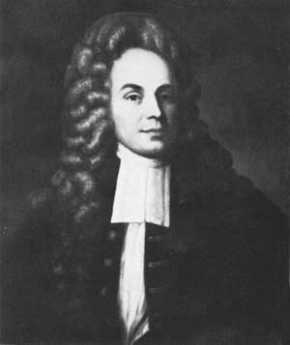
|
| Andrew Hamilton |
That is definitely not Alexander Hamilton, nearly a century younger and no relation. Andrew was born in Virginia but moved to Philadelphia in 1716, aged 30. He is frequently referred to as the finest lawyer of his era in America, holding numerous public offices. He was Speaker of the Pennsylvania House of Representatives in 1735, and 59 years old, when he took on the task of defending John Peter Zenger the New York publisher. For this successful case, he is mainly known today, but it is not true at all that he was then a young unknown lawyer trying to establish a reputation as, the lawyers say, a rainmaker. Rather, he took up the task of defending Zenger in another colony, without fee, because he felt there existed a threat to the entire judicial system and someone had to assert leadership about it. Zenger was in conflict with the Governor of New York, evidently a ruthless sort of person, and the Governor had disbarred Zenger's two defense lawyers for opposing him. Hamilton felt it was the duty of an eminent lawyer from another colony to come forward and see that justice was defended. It was surely not immodest of him to feel that even a wild and wooly governor would not dare disbar the famous chief legislative officer of Pennsylvania. There was probably still some personal risk, and even some risk to professional reputation, because Zenger seemed clearly guilty of breaking the libel laws as they were then understood.
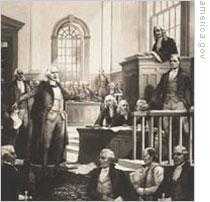 t6
t6
|
| Trial |
Zenger had published articles describing the outrageous conduct of the Governor, and could not deny he had published them. In the common view, he had labeled the Governor. The judge refused to hear evidence that the published stories were true because the law stated that truth was not a defense. The only defense seemingly possible was that the stories somehow did not meet the definition of libel, and the judge suggested to Hamilton that he get on with arguing that particular escape-hatch. Hamilton, however, would have none of it.
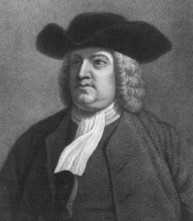
|
| William Penn |
His first statement in defense was that he and his client readily admitted the published articles met the definition of libel, so he would save the prosecutor's time presenting witnesses on the point. He turned to the jury and urged them to nullify any law which prevented injured people from making a truthful complaint, as William Penn had established they had a right to do, nearly a century earlier. In a sense, both Penn and Hamilton were going back to the Magna Charta, where a jury was seen able to set a limit on what any king could do to an Englishman. The judge intervened that a jury may do what they were instructed to do. Yes, said Hamilton, and they may do otherwise. Although the jury had surely never heard of such legal fine points, they didn't like the idea of punishing a man for telling the truth, and firmly declared that Peter Zenger was therefore not guilty of anything, including libel, for doing so.
These principles were destined to become embedded in the United States Constitution fifty years later and were greeted with great praise and published applause by Benjamin Franklin, then the young publisher of the largest newspaper in Pennsylvania. Evidently, Franklin and Hamilton sought each other out, and in time Franklin became the protege and main political associate of Hamilton in the Pennsylvania Legislature.
The Zenger case established the fame of Philadelphia lawyers for all time, and Hamilton is honored by the Philadelphia bar association as their patron saint. No doubt he welcomed the praise of his colleagues, but he certainly did not need it. He had already risen to the top before this case, and it was for that reason he took it on, not as a duty to Zenger, but as a duty to the Law. Like so many people who achieve a little eminence, he had everything to lose and nothing to gain by taking risks. But unlike a common lot of prominent people, he felt a duty to do what he had to do.
Details of the rest of Andrew Hamilton's life are surprisingly sketchy, but property records establish that he was remarkable in a lot of other ways, too. He purchased the land on which Independence Hall is situated, and gave it to the public. He purchased five hundred acres in the wilderness and founded the City of Lancaster on it. And he purchased two hundred fifty acres, later expanded to six hundred, on the high bank of the Schuylkill where European settlement had been first begun by the Dutch, at Gray's Ferry. His son built Woodlands as a country estate, established Woodland Cemetery along Woodland Avenue, and built Hamilton Village as the place in West Philadelphia where the Drexels, Weightmans, Pauls and other wealthy families put their mansions. If you like, you can stroll down the center of the University of Pennsylvania campus, on Hamilton Walk.
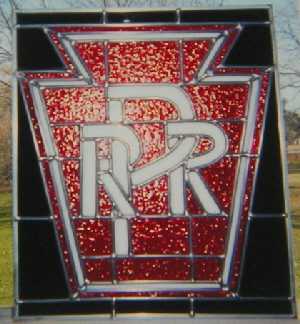
|
| Penn Railroad |
Someday, the glory of all this will surely return. Meanwhile, the Pennsylvania Railroad and successors have made the Gray's Ferry area nearly uninhabitable. Woodland sits behind a thicket of untended bramble, hidden from the trains except for the briefest glimpse if you know to look. The Veteran's Administration Hospital sits on the edge of Woodland, blocking the view unless you know to use Google Earth to see it sitting there begging to be visited. The University has turned its back on Woodland, using it mostly as a backdoor driveway toward its numerous parking garages, fearful the world might notice how close it is to deplorable slums.
ut some day, we can confidently expect that vision will re-emerge, the Schuylkill waterfront should resemble the Seine through Paris, linking Woodland to Bartram's Gardens, and perhaps on to Fort Mifflin. When that day dawns, maybe more people will also remember who Andrew Hamilton was.
French Philadelphia
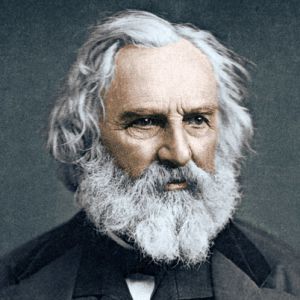
|
| Henry Wadsworth Longfellow |
Since American relations with France are a little strained at the moment, it may not be completely welcome to hear it said that Philadelphia food is Creole. The reference is not to the several downtown French restaurants of outstanding quality, but to the two episodes when Philadelphia experienced waves of French immigration. The first of these was during the French and Indian War, when the Acadian French ("Cajun") were driven out of Nova Scotia, largely went to Louisiana and then were allowed to return. A lot of them stopped off in Philadelphia both going and coming. Henry Wadsworth Longfellow depicted, in his poem Evangeline, the tearful reunion of Evangeline and Gabriel in the hospital. And since for sixty years the Pennsylvania Hospital was the only hospital in the country, Longfellow had to put them here.
The second wave of French immigration was provoked by the guillotine in Paris, and the black revolution in French Haiti. Most people today are unaware that Talleyrand lived here, and LaRochefoucauld. The Duke of Orleans, future king of France, lived at 4th and Locust Streets, proposed to a (rich) Philadelphia lady, and was rejected by her father ("Sir, if you do not become king of France, you will be no match for her, and if you do become king, she will be no match for you.") Napoleon's brother Joseph lived at 9th and Spruce, and one of his marshals lived at 6th and Spruce. Really. Talleyrand had a deformed foot, and this somehow made him pals with Governor Morris who had a wooden leg. This friendship was part of the reason the Louisiana Purchase was possible, because they shared the favors of the same French lady, and had frequent occasion to meet. Both Franklin and Jefferson were ambassadors to France, it may be remembered, and for a while, Jefferson was quite a fan of the French Revolution, although the treatment of LaFayette by the French Revolutionaries did not exactly encourage that. The French treated Franklin like a God, but then so did Mozart and the King of England, and Franklin harbored many bitter memories of the French and Indian War all the while he was romancing the French into bankruptcy to pay for our revolution. The French refugees from Haiti brought Yellow Fever with them, and Dengue too, thus definitively terminating Philadelphia's hope of remaining the permanent capital of the nation.
It was during this Francophone period that Philadelphia cuisine acquired some characteristics which allow some food historians to call it Creole. Philadelphia Pepper Pot soup, for example, substituted tripe for terrapin. Those who know about these things say that many dishes now thought to be distinctly Philadelphian in fact had a French origin.
The Richest Men in America
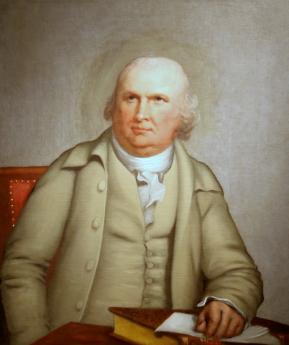
|
| Robert Morris |
Charles Peterson developed the idea but was unsuccessful in popularizing it, that Spruce Street in central Philadelphia could be regarded as an architectural museum. It stretches from river to river but has no bridge or ferry landing at either end, so traffic is less. The earliest house still standing near the Delaware River was built in 1702, with successive houses just a little younger, or at least less old, as you progress toward Broad (14th) Street whose houses were built around 1880. And then onward into the early Twentieth Century, crossing Broad Street and going westward toward the Schuylkill. For a century or more West Spruce Street was where eminent specialists had offices, much like Harley Street in London, which it somewhat resembles. The medical flowering of this area was promoted by the surgical advancements of the nearby Civil War, as well as the contributions of Andrew Carnegie to moving the College of Physicians from 13th street to 21st Street, attracted toward the 7000-bed Civil War hospital which turned into Philadelphia General Hospital in West Philadelphia. A number of these houses are just plain too big to be manageable as single family houses today, and Spruce Street West has lagged Society Hill and other Easterly sections in restoring its buildings. Perhaps in a few decades, that will happen, and perhaps in the meantime, the present relics will be preserved enough to revive someday the idea of a house design museum. Meanwhile, West Philadelphia around Spruce Street has obstructed progression by plonking the University of Pennsylvania, Drexel University and the Science Center as obstacles to residential housing development.
So let's take a simpler idea. For roughly a century, the then-richest men in America lived in one of several houses located within seven blocks of each other, easy walking distance for a tour. The first to attract notice as a self-made rich man was Robert Morris. Morris made his money in shipping, maybe even a little privateering, and then went into banking to keep his money at work. It is said that his personal fortune, adjusted for changes in the currency and economy, was once considerably larger than Bill Gates' would be today, adjusted for inflation. As most people know, Morris financed the American Revolution personally, went broke, ending up in debtor's prison. The first real mansion he lived in was opposite Independence Hall on Market Street, now celebrated as George Washington's while he was the first president. It was earlier the place where British Admiral Gates lived while he was in charge of the 1788 British occupation, and although it was also where Washington lived during most of his presidency, the house burned down in 1832. This house is not to be confused with either the house built for Washington at 9th and Market but never occupied by him or Morris's later mansions which he also never occupied because of financial difficulties. One house in the midst of Jeweler's Row was so ornate some think it contributed heavily to his later bankruptcy. A second Morris house still stands on Eighth Street at St. James Street, but it belonged to the Quaker Morris family, no relation. Other owners named Morris bought and occupied this place for a number of years, so its history is a little mixed up, presently as a fancy restaurant. A DuPont heiress once bought and fixed it up, but her husband commented no one could sleep in that house because a subway built underneath it badly rattled its timbers. Next door to the Quaker Morris house rises a fifty story apartment house, whereas a precaution against rattles, the first nine stories contain nothing but parking spaces. Since the apartment building is owned by Arabs, it is likely they are pretty rich but not necessarily richer than Bill Gates. Aside from the Market Street partial restoration, the main Robert Morris remnant is on Lemon Hill, northwardly opposite the Art Museum, whereas the main Quaker Morris house is in the Morris Arboretum in Chestnut Hill. There are sixty or so Morris's listed in the Social Directory, so keeping the two families distinct remains a difficulty in some circles.
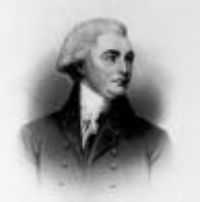
|
| William Bingham |
On the Northeast corner of Third and Spruce Street, once lived William Bingham, a former partner of Morris and later himself the richest man in America. Although sadly the house burned down, it is displayed in one of the famous prints by William Birch in his notable Eighteenth Century collection , widely available in bookstores. The striking thing about Bingham was that he was only twenty-eight years old when he achieved richest-man status and built the house, patterned after one owned by a British Duke. He made his pile three times over. First, running a privateer operation in the Caribbean for his partner Robert Morris. On returning home, he bought up any worthless Continental currency he could stuff into barrels, and then either persuaded his friend Alexander Hamilton to redeem the currency at par or heard his plan to do so. And then, as if he didn't have enough money already, he invested enough gold bars to finance the Louisiana Purchase for Jefferson, since Napoleon wanted gold, please, no paper money. Among the various things he bought as an investment was the area in upstate New York, now called Binghamton. He lost a pile of money buying the land we now call the State of Maine since post-revolutionary Westward migration turned toward Ohio rather than into his Maine holdings once the British prohibition on colonizing past the Allegheny mountains was lifted. Bingham's sister-in-law wanted to become engaged to the heir of the Crown of France, who was living in temporary exile around the corner on Walnut Street. In a famous, possibly fictional, response, the Dauphin was told, No. If you do not become the King of France, you will be no match for her "The Golden Voyage". Quite a good read, and of particular interest to Philadelphia lawyers who learn Bingham died in 1804, but his estate was not settled until 1960. The lawyer who closed the case reported his partners were less than pleased to see it go.
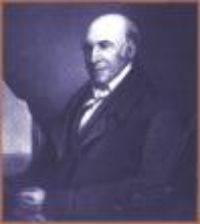
|
| Stephen Girard |
Stephen Girard built several houses a few steps west of Bingham on Spruce Street, identifiable by having marble facing on their lower few feet; Charles Peterson lived in one of them as the first pioneer resident of the Society Hill revival. Girard made his money in the China trade, as a ship's factor. Like Morris, he recognized America's crying need for banking in a story too complicated to repeat here and moved the Girard Bank into the First Bank of America, now a museum (Peale portraits, architectural fragments) of the Park Service on Third Street. His wife was insane, and spent most of her life at the Pennsylvania Hospital at Eight and Spruce, and was eventually buried there. Girard left thirty million dollars to found the Girard College for "poor, white, orphan boys". His 1830 will withstood all legal attacks until the mid-Twentieth Century but was eventually broken. The school now has many black girls, is bankrupt, and the definition of orphan has expanded to include any child whose parents are separated. The definition of "poor" is several times greater than the national definition of the poverty level. In his will, Girard specified that the estate should purchase what is now Schuylkill County and hold it for a century. Shortly thereafter (or just possibly very shortly before that), coal was discovered in the region and Girard College became far richer. His correspondence includes many letters to Lafitte the Pirate, so more may be heard of them.
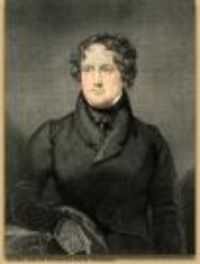
|
| Nichlos Biddle |
Nicholas Biddle had "old money", which he made in the traditional way of buying real estate, particularly in Ohio. He thus made a better guess than Bingham about the likely path of westward migration. But like Morris and Girard, he needed a bank to finance the real estate. Biddle also acted as the reserve bank for the myriads of currencies then issued by individual rural banks and charged a transaction fee to translate Kentucky money into something useful in Philadelphia or abroad. Martin Van Buren, who was the political manipulator behind Andrew Jackson and who became Andrew Jackson's eventual successor, stirred up trouble about this reserve role, and Jackson "broke" Biddle's bank by withdrawing federal deposits. Jackson's complaint was that holding federal "paper" eventually resulted in a government guarantee the bank could never fail, in an echo of the present accusation of some banks being "too big to fail". Ultimately, investment banking began to take its modern formwhen in 1838, the richest man, Anthony J. Drexel, moved over the Schuylkill River on Walnut Street, amidst what is now the University of Pennsylvania, but not far from Drexel University. He walked to work each day, however, at 4th and Chestnut Streets. Drexel was the first big banker to make his fortune in banking, and when he died it was said Philadelphia banking died with him. The earlier big bankers started out with money they had made in shipping or land speculation, but Drexel somehow saw that banking was a different way to get rich, deftly filling in the gap created by Andrew Jackson shuttering Nicholas Biddle's Second Bank. Part of the idea in Van Buren's mind was to shift the focus of American banking from Philadelphia's Chestnut Street to New York's Wall Street, and he was quickly quite successful. J.P. Morgan was invited by Drexel to start a Wall Street partnership with him in correspondence with his father, Junius Morgan, who ran an international bank in London. In the era just after the Civil War, there was a great deal of money in Europe anxious to be invested in the railroads and other booming American industries. The Morgans provided a vehicle for transferring such investment capital between continents, but the Morgans were viewed as having excessively sharp practices. As it happened, Junius Morgan had been trained in this transoceanic concept by George Peabody, a former Baltimore resident who had moved to London, then, the banking capital of the world.
George Peabody earlier had also been involved with Anthony J. Drexel, and Drexel was the more successful of the two international bankers. The whole issue with European investors was whether you could trust those wild and wooly Americans, and Drexel consistently demonstrated he was entitled to be called a straight arrow. As related by a good book by Dan Rottenberg Drexel decided he needed the vigor of the Morgans and invited them to join him in a New York-Philadelphia partnership. From that point forward, JP Morgan was the shining star of honesty and straight dealing, a lesson he evidently learned from Drexel. Indeed, he and his biographers repeatedly stress this feature of him -- "I will never do business with a man I don't trust". He didn't mention women, but his behavior seems to show he probably didn't include them in the concept. Drexel, on the other hand, led a quiet sober life in West Philadelphia, reading books, starting his university, and helping his niece, who was later made a Saint in the Catholic Church, start numerous charities. Although the Drexel children more or less drifted out of sight, Drexel's business successor Stotesbury led a wild and extravagant lifestyle that is the subject of many songs and stories. His wife, for example, never washed the sheets; she always had brand new ones put on the bed. Morgan, of course, spent lots of money in a conspicuous way. The term Metropolitan identifies most of his projects, The Metropolitan Art Museum, The Metropolitan Opera, The Metropolitan Club on Fifth Avenue, with membership originally limited to his partners. The name Corsair also was a trademark, the name of his yachts, and a firm statement about his approach to things. Another difference between the Morgans and the Drexels was similarly in the New York-Philadelphia character. When Jack Morgan, the son of JP, died in the 1930's he left an estate of "only" three million dollars. It would be hard to say what the Drexel fortune was worth at that time, but it is safe to say it would dwarf that, considerably. Most of the Drexel family moved to London, but among other things, financed the restoration of the Benjamin Franklin House on Craven Street, a hundred feet from Trafalgar Square. When the House of Drexel was much blamed for the 1987 stock market crash, legions of Drexel defenders rose to protect the family name. Cabrini College, Eastern University, Valley Forge Military College, St. David's golf course and much of Radnor are only pieces of the Drexel holdings, today.
Charles Peterson and Amity Buttons
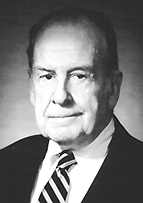
|
| Charles Peterson |
Charles Peterson, the famous architectural historian and preservationist, died just before his 98th birthday on August 19, 2004. It is to him we largely owe the redevelopment of Society Hill, and the design of the Independence National Park, as well as a host of restorations from the Adams Mansion of Quincy, Massachusetts, to the early French settlements along the Mississippi. He conceived of many national historic preservation projects, the most notable of which is the Historic American Buildings Survey (HASB) of the Department of the Interior.
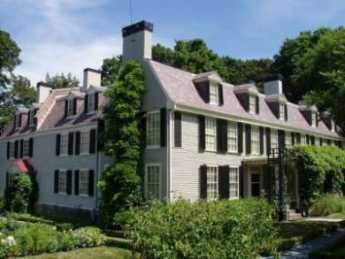
|
| The Adams Mansion |
While he was most notable for large visions and huge projects, he also had a keen appreciation for fastidious accuracy in small matters, of which the Amity Button would be a vivid example. In the surviving Colonial buildings of Philadelphia, it is common to find a plain ivory coat button nailed to the top of the newel post of the main staircase. There's one in Independence Hall, another in the grand staircase of the Pennsylvania Hospital, and there is one in Charlie Peterson's own home, the one where he was the first Society Hill gentrification pioneer, a house originally built by Stephen Girard around 3rd and Spruce.
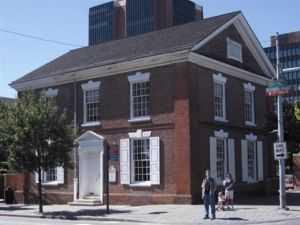
|
|
The Free Quaker Meeting House |
There is a strong tradition in Philadelphia that these strange buttons are Amity Buttons, nailed there by the Quaker builder at the moment when the new owner had fully settled his construction debt, symbolizing the amity between a willing buyer and a willing seller. Countless visitors to Society Hill have been shown these curious buttons, and it always seems to produce a warm glow of appreciation for the discovery. If you have one of these in your own house, you can be very proud.
Unfortunately, Charlie Peterson couldn't find any evidence for the truth of this fable, and you can be sure he subjected the matter to a totally dedicated search. You might think there would be some notations in the deeds, or in the correspondence of the day, or in the literature of the times. You would think that someone who repeats this tale would be able to relate where he got it, and that would lead to some letters in an attic, and that if you work hard enough, you will find it. But when the button matter came up, Mr. Peterson would suddenly become grim-lipped and sad, and repeat the mantra that there is no evidence to support the story. He even awarded prizes to architectural students for essays on newel posts, banisters, and stair rails, but no student essay ever turned up any authentication of the Amity Button story. Absence of evidence is of course not the same as evidence of absence, so it is remotely possible that the story will someday be vindicated.
Indeed, you have to believe there was something or other to start the story. Victor Failmetzger and his wife, who have a notable reputation for authenticating old house parts, relate that in Colonial Virginia it was common to have hollow newel posts on the stairway, and occasionally to find the deed to the house secreted in one of them. So the search goes on.
In fact, it always seemed likely that Charles Peterson very much wanted to believe the fable was true. But until some evidence turned up, he was going to go to his grave with the declaration that there existed no evidence for it.
Stephen Girard 1750-1831
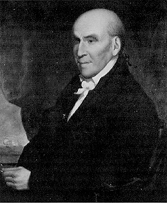
|
| Stephen Girard |
Girard was born in Bordeaux, France and never went to school. By the age of 23, he had become a sea captain, like his father and grandfather. By the age of 27, he owned his own ship and was thus launched on a successful career in a very dangerous occupation. Depending on the destination and weather during that era, up to forty percent of sailors were lost at sea on long voyages. From the point of view of the passengers and shippers, when you were selecting a captain you wanted one who had returned unharmed from many voyages. It was irrelevant whether he had been lucky, or diligent, or had learned a lot from his relatives in the trade.
Stephen Girard did start with a handicap, being born blind in one eye. It may have been a personality disorder which drove him to precise, minute instructions to his subordinates in excruciating detail; he might now be called a "control freak" and be disliked for it. For example, he kept a handwritten copy of all letters he wrote, and at his death, there were 14,000 of them, sorted and filed. His wife went insane, and after spending years at the Pennsylvania Hospital, was buried on the grounds. If this is the price of being rich, some might consider remaining poor. During his working years in Philadelphia, he would normally get to the counting-house at 5 AM, go to his bank at noon, and go to work on his 600-acre farm in South Philadelphia after 5 PM. He said he liked farm work the best. The image left behind by this role model, then, was workaholic. Nevertheless, if you wanted to become the richest man in America, here was the pattern to follow.
Girard probably came as close as any rich man in history, to "taking it with him" when he died. His innately compulsive personality, combined with the sure knowledge that his relatives and others would probably try to break his will for their own benefit, led to the construction of a last will and testament that withstood a century of court challenges. It launched remarkable philanthropy for thousands of orphans and organized the whole Delaware Valley into an industrial machine unlike anything else in the country. Although he left the largest estate in the nation's history, that estate continued to accumulate money from his minute instructions to executors, eventually enlarging his vast fortune fifty-fold, a century after his death. In retrospect, Philadelphia might well have slowly declined into obscurity after the nation's capital moved to Washington in 1800. Instead, the coal, canal, railroad and industrial empire of the Philadelphia region became the "arsenal of the North" during the Civil War, and the main wealth generator of the Gilded Age which followed.
Girard's business career can be somewhat oversimplified as consisting of shipping at the base of his early good fortune, followed by banking during the era when banking was poorly understood and usually ineptly managed. He ended his career with an eager and successful embrace of the emerging Industrial Revolution. Throughout all of this, he characteristically took great risks for great profits, through recognizing what others were too timid to accept fully. On many occasions, his risky ventures resulted in very large losses, made acceptable by other risky ventures proving unexpectedly successful. An example would be Girard's Bank. When the Federal Government first started and then abandoned the First National Bank Girard bought up the remnants and made a great private success of banking, where he had little previous experience. He saw the potential of the canals, and later the railroads when others were content to be farmers or country gentlemen. When he was 79 years old, he purchased vast tracts of wilderness containing some outcroppings of coal, because he could foresee a great industrial future for the region. No pain, no gain.
Another way of looking at Girard was as the most prominent French-American citizen of his time. He arrived in Philadelphia at about the same time Benjamin Franklin stepped off another boat, returning from abusive treatment by British officials which finally flipped him for American independence. Franklin recognized that independence from England meant an alliance with France, or else it meant defeat. It is possible to view the American Revolution as an episode of France searching for an American foothold after its expulsion fifteen years earlier in the French and Indian War; trouble between Britain and its colonies might re-open opportunities for France. Girard was extremely friendly with Thomas Jefferson, the most Francophile of founders and early American presidents. When the War of 1812 with Great Britain threatened disaster for the new American state, Girard staked $8 million dollars, his whole fortune, on financing that war. During the entire period from 1776 to the Louisiana Purchase, America was wavering between its gratitude to France and underlying loyalty to the English-speaking community. During that long formative period, Girard the very rich Frenchman was hovering in the background, probably influencing American foreign policy more than is known, even today. But the France that Girard stood for was neither aristocratic of the LaFayette variety nor intellectual of the Robespierre sort. It was France of the French peasant, crabbed, acquisitive, and morose, forever responding to a "hidden hand" of his own self-interest in a way that paradoxically benefited his whole community, and thus would have hugely amused the Scotsman Adam Smith.
Jewelers Row
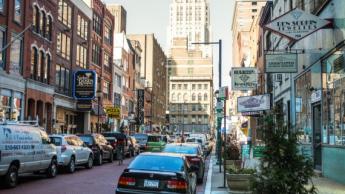
|
| Jewelers Row |
Since 1851 Jewelers have clustered on Samson Street mostly between 7th and 8th Streets, and for a block or two in all directions. Sixty years before that, the area had been the site of the most elaborate mansion in America, commissioned by Robert Morris, the Financier of the American Revolution, and built by Charles L'Enfant, the architect of the District of Columbia. About 150 jewelry and jewelry-related businesses are now located in this district, and their outward appearance suggests progressively improving prosperity for them. Some of this reflects the fear of impending inflation (national budget deficits and all that), or a possible decline in the value of the dollar, which amounts to the same thing. During inflationary times, the value of commodities increases; gold and diamonds are the ultimate commodities. In fact, it is widely believed that the price of gold has little to do with jewelry or commodities, and is mainly dependent on the prevailing level of distrust of paper money. For their part, diamonds additionally suit themselves to be hidden in the heel of your shoe if things get tough enough.
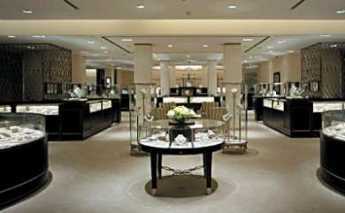
|
| Jeweler Shops |
However, J. E. Caldwell's just moved out of the center of the city, and Bailey, Banks and Biddle were sold to people from Texas or somewhere. So the jewelry trade is not universally prosperous, just Samson Street, the Jewelers' Row. Why in the world would 150 little jeweler shops want to cluster together, where people mostly can't tell one from the other, and the products look pretty much alike to anybody who isn't in love and looking for an engagement ring? You would think a competitor next door on either side, and another competitor upstairs, and still others across the street would be something a shrewd merchant would flee, not seek out. Come to think of it, the same thing is true of Antique Row, or the fabric cluster, or a dozen similar clusters in New York City. In New York, it is possible to see a dozen shops next to each other, every one of them selling trombones.
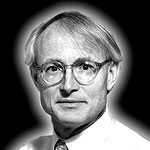
|
| Professor Michael Porter |
Michael Porter of the Harvard Business School has offered an explanation of the economics of a business cluster as an "Innovation cluster". He feels clustering is one of the important ways businesses hold down costs and improve productivity, by innovating rather than merely stressing efficiency. If efficiency and productivity sound like the same thing, it may help to know that efficiency is only a part of productivity, with profitability to the owner of the firm only increasing if the quality of the product steadily improves, which holds up retail prices. Let's put the idea in another way: the innovative, latest and greatest, of any product, commands the highest mark up among similar objects. If you position yourself as producing the latest and greatest, you are going to get a continuously higher markup. In an era of declining prices, the higher markup may express itself as simply maintaining the old prices, so anyway being a part of an innovation cluster assures you of the highest profit available, if you must be in that business. Clusters provide vigorous price competition, all right, and that automatically assures that true prices levels (i.e. after a little bargaining) are likely to be trustworthy measures of value, even in a shabby little hole-in-the-wall. Making jewelry is not rocket science, but there's enough to it that it helps to be located in an area with an abundant supply of skilled and experienced employees. Philadelphia's diamond cluster is the oldest, and still the second largest, jewelry district in the country.
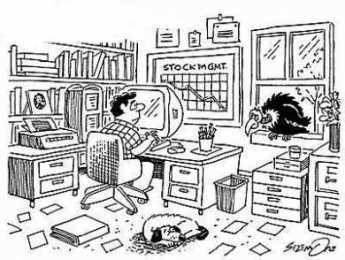
|
| Extra Policing |
Having a lot of portable but largely unidentifiable merchandise concentrated in a few blocks creates a special need for police protection. These shops all have safes, and probably most of them have handguns, but there is a great deal of street traffic among shops, carrying valuable gems in their hip pockets. The City provides extra policing out of recognition of the risk, and the local merchants contribute to hiring extra private detectives to lounge around. When basement flooding at the local electric power substation recently caused a blackout, a lot of extra police were immediately dispatched to Jewelers' Row, just in case somebody got the idea that looting might be attractive. And then it is said, just rumored, that some of the merchants who have plenty of goods loaned to their neighbors on consignment employ private protection of an unlicensed sort, in case they have a problem getting their goods back.
It must be pretty boring to sit all day every day in a little shop that makes one or two sales a week, except at special holidays. One jeweler I know has a portable computer under the counter and spends a lot of time day-trading, which is buying stocks in the morning and selling them in the afternoon. Although competition in the district goes well beyond vigorous, there is an active fraternity of jewelers in the area, steering customers to each other when they don't have a requested item themselves, eating lunch at one of the local bistros, exchanging gossip of the trade, carefully observing the traffic up and down the sidewalks. And then, if there is no traffic they can always have their wives, daughters or neighbors sit on a high stool in front of the counter. Trying on jewelry.
Last Will of Benjamin Franklin
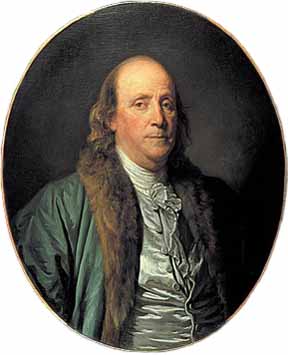
|
| Benjamin Franklin |
The Last Will and Testament of Benjamin Franklin
I, Benjamin Franklin, of Philadelphia, printer, late Minister Plenipotentiary from the United States of America to the Court of France, now President of the State of Pennsylvania, do make and declare my last will and testament as follows:
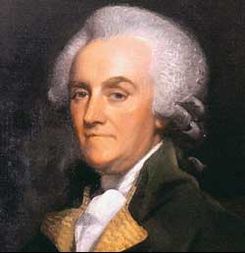
|
| William Franklin |
To my son, William Franklin, late Governor of the Jerseys, I give and devise all the lands I hold or have a right to, in the province of Nova Scotia, to hold to him, his heirs, and assigns forever. I also give to him all my books and papers, which he has in his possession, and all debts standing against him on my account books, willing that no payment for, nor restitution of, the same be required of him, by my executors. The part he acted against me in the late war, which is of public notoriety, will account for my leaving him no more of an estate he endeavored to deprive me of.
Having since my return from France demolished the three houses in Market Street, between Third and Fourth Streets, fronting my dwelling-house, and erected two new and larger ones on the ground, and having also erected another house on the lot which formerly was the passage to my dwelling, and also a printing-office between my dwelling and the front houses; now I do give and devise my said dwelling-house, wherein I now live, my said three new houses, my printing- office and the lots of ground thereto belonging; also my small lot and house in Sixth Street, which I bought off the widow Henmarsh; also my pasture-ground which I have in Hickory Lane, with the buildings thereon; also my house and lot on the North side of Market Street, now occupied by Mary Jacobs, together with two houses and lots behind the same, and fronting on Pewter-Platter Alley; also my lot of ground in Arch Street, opposite the church-burying ground, with the buildings thereon erected; also all my silver plate, pictures, and household goods, of every kind, now in my said dwelling-place, to my daughter, Sarah Bache, and to her husband, Richard Bache, to hold to them for and during their natural lives, and the life of the longest liver of them, and from and after the decease of the survivor of them, I do give, devise, and bequeath to all children already born, or to be born of my said daughter, and to their heirs and assigns forever, as tenants in common, and not as joint tenants.
And, if any or either of them shall happen to die under age, and without issue, the part and share of him, her, or them, so dying, shall go to and be equally divided among the survivors or survivor of them. But my intention is, that, if any or either of them should happen to die under age, leaving issue, such issue shall inherit the part and share that would have passed to his, her, or their parent, had he, she, or they were living.
And, as some of my said devisees may, at the death of the survivor of their father or mother, be of age, and others of them underage, so as that all of them may not be of capacity to make division, I in that case request and authorize the judges of the Supreme Court of Judicature of Pennsylvania for the time being, or any three of them, not personally interested, to appoint by writing, under their hands and seals, three honest, intelligent, impartial men to make the said division, and to assign and allot to each of my devisees their respective share, which division, so made and committed to writing under the hands and seals of the said three men, or any two of them, and confirmed by the said judges, I do hereby declare shall be binding on, and conclusive between the said devisees.
All the lands near the Ohio, and the lots near the centre of Philadelphia, which I lately purchased of the State, I give to my son-in-law, Richard Bache, his heirs and assigns forever; I also give him the bond I have against him, of two thousand and one hundred and seventy-two pounds, five shillings, together with the interest that shall or may accrue thereon, and direct the same to be delivered up to him by my executors, canceled, requesting that, in consideration thereof, he would immediately after my decease manumit and set free his Negro man Bob. I leave to him, also, the money due to me from the State of Virginia for types. I also give to him the bond of William Goddard and his sister, and the counter bond of the late Robert Grace, and the bond and judgment of Francis Childs, if not recovered before my decease, or any other bonds, except the bond due from ----- Killian, of Delaware State, which I give to my grandson, Benjamin Franklin Bache. I also discharge him, my said son-in-law, from all claim and rent of money due to me, on book account or otherwise. I also give him all my musical instruments.
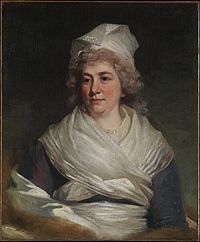
|
| Sarah Bache |
The king of France's picture, set with four hundred and eight diamonds, I give to my daughter, Sarah Bache, requesting , however, that she would not form any of those diamonds into ornaments either for herself or daughters, and thereby introduce or countenance the expensive, vain, and useless fashion of wearing jewels in this country; and those immediately connected with the picture may be preserved with the same.
I give and devise to my dear sister, Jane Mecom, a house and lot I have in Unity Street, Boston, nor or late under the care of Mr. Jonathan Williams, to her and to her heirs and assigns forever. I also give her the yearly sum of fifty pounds sterling, during life, to commence at my death, and to be paid to her annually out of the interests or dividends arising on twelve shares which I have since my arrival at Philadelphia purchased in the Bank of North America, and, at her decease, I give the said twelve shares in the bank to my daughter, Sarah Bache, and her husband, Richard Bache. But it is my express will and desire that, after the payment of the above fifty pounds sterling annually to my said sister, my said daughter be allowed to apply the residue of the interest or dividends on those shares to her sole and separate use, during the life of my said sister, and afterwards the whole of the interest or dividends thereof as her private pocket money.
I give the right I have to take up to three thousand acres of land in the State of Georgia, granted to me by the government of that State, to my grandson, William Temple Franklin, his heirs and assigns forever. I also give to my grandson, William Temple Franklin, the bond and judgment I have against him of four thousand pounds sterling, my right to the same to cease upon the day of his marriage; and if he dies unmarried, my will is, that the same be recovered and divided among my other grandchildren, the children of my daughter, Sarah Bache, in such manner and form as I have herein before given to them the other parts of my estate.
The philosophical instruments I have in Philadelphia I give to my ingenious friend, Francis Hopkinson.
To the children, grandchildren, and great-grandchildren of my brother, Samuel Franklin, that may be living at the time of my decease, I give fifty pounds sterling, to be equally divided among them. To the children, grandchildren, and great-grandchildren of my sister, Anne Harris, that may be living at the time of my decease, I give fifty pounds sterling to be equally divided among them. To the children, grandchildren, and great-grandchildren of my brother James Franklin, that may be living at the time of my decease, I give fifty pounds sterling to be equally divided among them. To the children, grandchildren, and great-grandchildren of my sister, Sarah Davenport, that may be living at the time of my decease, I give fifty pounds sterling to be equally divided among them. To the children, grandchildren, and great-grandchildren of my sister, Lydia Scott, that may be living at the time of my decease, I give fifty pounds sterling to be equally divided among them. To the children, grandchildren, and great-grandchildren of my sister, Jane Mecom, that may be living at the time of my decease, I give fifty pounds sterling to be equally divided among them.
I give to my grandson, Benjamin Franklin Bache, all the types and printing materials, which I now have in Philadelphia, with the complete letter foundry, which, in the whole, I suppose to be worth near one thousand pounds; but if he should die under age, then I do order the same to be sold by my executors, the survivors or survivor of them, and the money be equally divided among all the rest of my said daughter's children, or their representatives, each one on coming of age to take his or her share, and the children of such of them as may die under age to represent and to take the share and proportion of, the parent so dying, each one to receive his or her part of such share as they come of age.
With regard to my books, those I had in France and those I left in Philadelphia, is now assembled together here, and a catalog made of them, it is my intention to dispose of them as follows: My "History of the Academy of Sciences," in sixty or seventy volumes quarto, I give to the Philosophical Society of Philadelphia, of which I have the honor to be President. My collection in a folio of "Les Arts et les Metiers," I give to the American Philosophical Society, established in New England, of which I am a member. My quarto edition of the same, "Arts et Metiers," I give to the Library Company of Philadelphia. Such and so many of my books as I shall mark on my said catalog with the name of my grandson, Benjamin Franklin Bache, I do hereby give to him; and such and so many of my books as I shall mark on the said catalog with the name of my grandson, William Bache, I do hereby give to him; and such as shall be marked with the name of Jonathan Williams, I hereby give to my cousin of that name. The residue and remainder of all my books, manuscripts, and papers, I do give to my grandson, William Temple Franklin. My share in the Library Company of Philadelphia, I give to my grandson, Benjamin Franklin Bache, confiding that he will permit his brothers and sisters to share in the use of it.
I was born in Boston, New England, and owe my first instructions in literature to the free grammar schools established there. I, therefore, give one hundred pounds sterling to my executors, to be by them, the survivors or survivor of them, paid over to the managers or directors of the free schools in my native town of Boston, to be by them, or by those person or persons, who shall have the superintendence and management of the said schools, put out to interest, and so continued at interest forever, which interest annually shall be laid out in silver medals, and given as honorary rewards annually by the directors of the said free schools belonging to the said town, in such manner as to the discretion of the selectmen of the said town shall seem meet.
Out of the salary that may remain due to me as President of the State, I do give the sum of two thousand pounds sterling to my executors, to be by them, the survivors or survivor of them, paid over to such person or persons as the legislature of this State by an act of Assembly shall appoint to receive the same in trust, to be employed for making the river Schuylkill navigable.
And what money of mine shall, at the time of my decease, remain in the hands of my bankers, Messrs. Ferdinand Grand and Son, at Paris, or Messrs. Smith, Wright, and Gray, of London, I will that, after my debts are paid and deducted, with the money legacies of this my will, the same be divided into four equal parts, two of which I give to my dear daughter, Sarah Bache, one to her son Benjamin, and one to my grandson, William Temple Franklin.
During the number of years I was in business as a stationer, printer, and postmaster, a great many small sums became due for books, advertisements, postage of letters, and other matters, which were not collected when, in 1757, I was sent by the Assembly to England as their agent, and by subsequent appointments continued there till 1775, when on my return, I was immediately engaged in the affairs of Congress and sent to France in 1776, where I remained nine years, not returning till 1785, and the said debts, not being demanded in such a length of time, are become in a manner obsolete, yet are nevertheless justly due. These, as they are stated in my great folio ledger E, I bequeath to the contributors to the Pennsylvania Hospital, hoping that those debtors, and the descendants of such as are deceased, who now, as I find, make some difficulty of satisfying such antiquated demands as just debts, may, however, be induced to pay or give them as charity to that excellent institution. I am sensible that much must inevitably be lost, but I hope something considerable may be recovered. It is possible, too, that some of the parties charged may have existing old, unsettled accounts against me; in which case the managers of the said hospital will allow and deduct the amount, or pay the balance if they find it against me.
My debts and legacies being all satisfied and paid, the rest and residue of all my estate, real and personal, not herein expressly disposed of, I do give and bequeath to my son and daughter, Richard and Sarah Bache.
I request my friends, Henry Hill, Esquire, John Jay, Esquire, Francis Hopkinson, Esquire, and Mr. Edward Duffield, of Benfield, in Philadelphia County, to be the executors of this my last will and testament; and I hereby nominate and appoint them for that purpose.
I would have my body buried with as little expense or ceremony as may be. I revoke all former wills by me made, declaring this only to be my last.
In witness whereof, I have hereunto set my hand and seal, this seventeenth day of July, in the year of our Lord, one thousand seven hundred and eighty-eight.
B. Franklin
Signed, sealed, published, and declared by the above named Benjamin Franklin, for and as his last will and testament, in the presence of us.
Abraham Shoemaker, John Jones, George Moore.
CODICIL
I, Benjamin Franklin, in the foregoing or annexed last will and testament named, having further considered the same, do think proper to make and publish the following codicil or addition thereto.
It has long been a fixed political opinion of mine, that in a democratical state there ought to be no offices of profit, for the reasons I had given in an article of my drawing in our constitution, it was my intention when I accepted the office of President, to devote the appointed salary to some public uses. Accordingly, I had already, before I made my will in July last, given large sums of it to colleges, schools, the building of churches, etc.; and in that will I bequeathed two thousand pounds more to the State for the purpose of making the Schuylkill navigable. But understanding since that such a work, and that the project is not likely to be undertaken for many years to come, and having entertained another idea, that I hope may be more extensively useful, I do hereby revoke and annul that bequest, and direct that the certificates I have for what remains due to me of that salary be sold, towards raising the sum of two thousand pounds sterling, to be disposed of as I am now about to order.
It has been an opinion, that he who receives an estate from his ancestors is under some kind of obligation to transmit the same to their posterity. This obligation does not lie on me, who never inherited a shilling from an ancestor or relation. I shall, however, if it is not diminished by some accident before my death, leave a considerable estate among my descendants and relations. The above observation is made as merely as some apology to my family for making bequests that do not appear to have any immediate relation to their advantage.
I was born in Boston, New England, and owe my first instructions in literature to the free grammar schools established there. I have, therefore, already considered these schools in my will. But I am also under obligations to the State of Massachusetts for having, unasked, appointed me formerly their agent in England, with a handsome salary, which continued some years; and although I accidentally lost in their service, by transmitting Governor Hutchinson's letters, much more than the amount of what they gave me, I do not think that ought in the least to diminish my gratitude.
I have considered that, among artisans, good apprentices are most likely to make good citizens, and, having myself been bred to a manual art, printing, in my native town, and afterward assisted to set up my business in Philadelphia by kind loans of money from two friends there, which was the foundation of my fortune, and all the utility in life that may be ascribed to me, I wish to be useful even after my death, if possible, in forming and advancing other young men, that may be serviceable to their country in both these towns. To this end, I devote two thousand pounds sterling, of which I give one thousand thereof to the inhabitants of the town of Boston, in Massachusetts, and the other thousand to the inhabitants of the city of Philadelphia, in trust, to and for the uses, intents, and purposes hereinafter mentioned and declared.
The said sum of one thousand pounds sterling, if accepted by the inhabitants of the town of Boston, shall be managed under the direction of the selectmen, united with the ministers of the oldest Episcopalians, Congregational, and Presbyterian churches in that town, who are to let out the sum upon interest, at five per cent, per annum, to such young married artificers, under the age of twenty-five years, as have served an apprenticeship in the said town, and faithfully fulfilled the duties required in their indentures, so as to obtain a good moral character from at least two respectable citizens, who are willing to become their sureties, in a bond with the applicants, for the repayment of the moneys so lent, with interest, according to the terms hereinafter prescribed; all which bonds are to be taken for Spanish milled dollars, or the value thereof in current gold coin; and the managers shall keep a bound book or books, wherein shall be entered the names of those who shall apply for and receive the benefits of this institution, and of their sureties, together with the sums lent, the dates, and other necessary and proper records respecting the business and concerns of this institution. And as these loans are intended to assist young married artificers in setting up their business, they are to be proportioned by the discretion of the managers, so as not to exceed sixty pounds sterling to one person, nor to be less than fifteen pounds; and if the number of appliers so entitled should be so large as that the sum will not suffice to afford to each as much as might otherwise not be improper, the proportion to each shall be diminished so as to afford to everyone some assistance. These aids may, therefore, be small at first, but, as the capital increases by the accumulated interest, they will be ampler. And in order to serve as many as possible in their turn, as well as to make the repayment of the principal borrowed easier, each borrower shall be obliged to pay, with the yearly interest, one-tenth part of the principal and interest, so paid in, shall be again let out to fresh borrowers.
And, as it is presumed that there will always be found in Boston virtuous and benevolent citizens, willing to bestow a part of their time in doing good to the rising generation, by superintending and managing this institution gratis, it is hoped that no part of the money will at any time be dead, or be diverted to other purposes, but be continually augmenting by the interest; in which case there may, in time, be more than the occasions in Boston shall require, and then some may be spared to the neighboring or other towns in the said State of Massachusetts, who may desire to have it; such towns engaging to pay punctually the interest and the portions of the principal, annually, to the inhabitants of the town of Boston.
If this plan is executed, and succeeds as projected without interruption for one hundred years, the sum will then be one hundred and thirty-one thousand pounds; of which I would have the managers of the donation to the town of Boston then layout, at their discretion, one hundred thousand pounds in public works, which may be judged of most general utility to the inhabitants, such as fortifications, bridges, aqueducts, public buildings, baths, pavements, or whatever may make living in the town more convenient to its people, and render it more agreeable to strangers resorting thither for health or a temporary residence. The remaining thirty-one thousand pounds I would have continued to be let out on interest, in the manner above directed, for another hundred years, as I hope it will have been found that the institution has had a good effect on the conduct of youth, and been of service to many worthy characters and useful citizens. At the end of this second term, if no unfortunate accident has prevented the operation, the sum will be four million and sixty-one thousand pounds sterling, of which I leave one million sixty-one thousand pounds to the disposition of the inhabitants of the town of Boston, and three million to the disposition of the government of the state, not presuming to carry my views farther.
All the directions herein given, respecting the disposition and management of the donation to the inhabitants of Boston, I would have observed respecting that to the inhabitants of Philadelphia, only, as Philadelphia is incorporated, I request the corporation of that city to undertake the management agreeably to the said directions; and I do hereby vest them with full and ample powers for that purpose. And, having considered that the covering a ground plot with buildings and pavements, which carry off most of the rain and prevent its soaking into the Earth and renewing and purifying the Springs, whence the water of wells must gradually grow worse, and in time be unfit for use, as I find has happened in all old cities, I recommend that at the end of the first hundred years, if not done before, the corporation of the city Employ a part of the hundred thousand pounds in bringing, by pipes, the water of Wissahickon Creek into the town, so as to supply the inhabitants, which I apprehend may be done without great difficulty, the level of the creek is much above that of the city, and may be made higher by a dam. I also recommend making the Schuylkill completely navigable. At the end of the second hundred years, I would have the disposition of the four million and sixty-one thousand pounds divided between the inhabitants of the city of Philadelphia and the government of Pennsylvania, in the same manner as herein directed with respect to that of the inhabitants of Boston and the government of Massachusetts.
It is my desire that this institution should take place and begin to operate within one year after my decease, for which purpose due notice should be publicly given previous to the expiration of that year, that those for whose benefit this establishment is intended may make their respective applications. And I hereby direct my executors, the survivors or survivor of them, within six months after my decease, to pay over the sum of two thousand pounds sterling to such persons as shall be duly appointed by the Selectmen of Boston and the corporation of Philadelphia, to receive and take charge of their respective sums, of one thousand pounds each, for the purposes aforesaid.
Considering the accidents to which all human affairs and projects are subject in such a length of time, I have, perhaps, too much flattered myself with a vain fancy that these dispositions, if carried into execution, will be continued without interruption and have the effects proposed. I hope, however, that is the inhabitants of the two cities should not think fit to undertake the execution, they will, at least, accept the offer of these donations as a mark of my good will, a token of my gratitude, and a testimony of my earnest desire to be useful to them after my departure.
I wish, indeed, that they may both undertake to endeavor the execution of the project, because I think that, though unforeseen difficulties may arise, expedients will be found to remove them, and the scheme be found practicable. If one of them accepts the money, with the conditions, and the other refuses, my will then is, that both Sums be given to the inhabitants of the city accepting the whole, to be applied to the same purposes, and under the same regulations directed for the separate parts; and, if both refuse, the money, of course, remains in the mass of my Estate, and is to be disposed of therewith according to my will made the Seventeenth day of July, 1788.
I wish to be buried by the side of my wife, if it may be, and that a marble stone, to be made by Chambers, six feet long, four feet wide, plain, with only a small molding around the upper edge, and this inscription:
Benjamin And Deborah Franklin 178-
to be placed over us both. My fine crab-tree walking stick, with a gold head, curiously wrought in the form of the cap of liberty, I give to my friend, and the friend of mankind, General Washington. If it were a Sceptre, he has merited it and would become it. It was a present to me from that excellent woman, Madame de Forbach, the Dowager Duchess of Deux-Ponts, connected with some verses which should go with it. I give my gold watch to my son-in-law Richard Bache, and also the gold watch chain of the Thirteen United States, which I have not yet worn. My timepiece, that stands in my library, I give to my grandson, William Temple Franklin. I give him also my Chinese gong. To my dear old friend, Mrs. Mary Hewson, I give one of my silver tankards marked for her use during her life, and after her decease, I give it to her daughter Eliza. I give to her son, William Hewson, who is my godson, my new quarto Bible, and also the botanic description of the plants in the Emperor's garden at Vienna, in folio, with colored cuts.
And to her son, Thomas Hewson, I give a set of "Spectators, Tattlers, and Guardians" handsomely bound.
There is an error in my will, where the bond of William Temple Franklin is mentioned as being four thousand pounds sterling, whereas it is but for three thousand five hundred pounds.
I give to my executors, to be divided equally among those that act, the sum of sixty pounds sterling, as some compensation for their trouble in the execution of my will; and I request my friend, Mr. Duffield, to accept moreover my French waywiser, a piece of clockwork in Brass, to be fixed to the wheel of any carriage; and that my friend, Mr. Hill, may also accept my silver cream pot, formerly given to me by the good Doctor Fothergill, with the motto, Keep bright the Chain. My reflecting telescope, made by Short, which was formerly Mr. Canton's, I give to my friend, Mr. David Rittenhouse, for the use of his observatory.
My picture, drawn by Martin, in 1767, I give to the Supreme Executive Council of Pennsylvania, if they shall be pleased to do me the honor of accepting it and placing it in their chamber. Since my will was made I have bought some more city lots, near the center part of the estate of Joseph Dean. I would have them go with the other lots, disposed of in my will, and I do give the same to my Son-in-law, Richard Bache, to his heirs and assigns forever.
In addition to the annuity left to my sister in my will, of fifty pounds sterling during her life, I now add thereto ten pounds sterling more, in order to make the Sum sixty pounds. I give twenty guineas to my good friend and physician, Dr. John Jones.
With regard to the separate bequests made to my daughter Sarah in my will, my intention is, that the same shall be for her sole and separate use, notwithstanding her coverture, or whether she be covert or sole; and I do give my executors so much right and power therein as may be necessary to render my intention effectual in that respect only. This provision for my daughter is not made out of any disrespect I have for her husband.
And lastly, it is my desire that this, my present codicil, be annexed to, and considered as part of, my last will and testament to all intents and purposes.
In witness whereof, I have hereunto set my hand and Seal this twenty-third day of June, Anno Domini one thousand Seven hundred and eighty-nine.
B. Franklin.
Signed, sealed, published, and declared by the above named Benjamin Franklin to be a codicil to his last will and testament, in the presence of us.
Francis Bailey, Thomas Lang, Abraham Shoemaker.
16 Blogs
Venturi's Franklin Museum in Franklin Court
 For several decades there has been a splendid museum of Franklin's personal life, hidden within the famous block where he once lived. Children love it.
.
For several decades there has been a splendid museum of Franklin's personal life, hidden within the famous block where he once lived. Children love it.
.
Armonica, Momentarily Mesmerizing
 The harmonica was a musical instrument invented by Ben Franklin, who else. Beethoven and Mozart wrote music for it. It made people sick and may even have killed someone.
The harmonica was a musical instrument invented by Ben Franklin, who else. Beethoven and Mozart wrote music for it. It made people sick and may even have killed someone.
Joseph Priestley, Shaker and Mover
 The father of the science of chemistry was also the founder of the Unitarian Church in America.
The father of the science of chemistry was also the founder of the Unitarian Church in America.
Carpenters Hall
 Carpenter's Hall now seems a little place, and it was chopped up into still smaller rooms at the time of the Continental CongressBut nevertheless it was the biggest rentable place in the largest town in the colonies, so 53 delegates crowded in and did their work.
Carpenter's Hall now seems a little place, and it was chopped up into still smaller rooms at the time of the Continental CongressBut nevertheless it was the biggest rentable place in the largest town in the colonies, so 53 delegates crowded in and did their work.
American Philosophical Society
 Franklin Declares Independence a Year Early
Franklin Declares Independence a Year Early
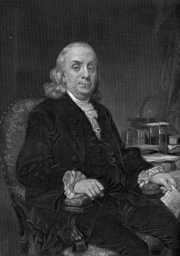 Franklin made no secret of his goal of national independence, at least a year before the Continental Congress voted and Thomas Jefferson composed his rather rambling declaration.
Franklin made no secret of his goal of national independence, at least a year before the Continental Congress voted and Thomas Jefferson composed his rather rambling declaration.
What Happened in Philadelphia on July 4, 1776?
 There were about 30,000 residents, just a small town, but it was the second largest city in the English-speaking world. Aside from wagons, there were thirty wheeled vehicles. But this is the town where decisions were made.
There were about 30,000 residents, just a small town, but it was the second largest city in the English-speaking world. Aside from wagons, there were thirty wheeled vehicles. But this is the town where decisions were made.
After the Convention:Hamilton and Madison
 Two of the main authors of the Federalist Papers -- and hence of the Constitution -- ultimately proved to be acting on entirely different sets of principles, aiming for widely different goals.
Two of the main authors of the Federalist Papers -- and hence of the Constitution -- ultimately proved to be acting on entirely different sets of principles, aiming for widely different goals.
Alexander Hamilton, Celebrity
 He had the kind of taudry private life and flashy public behavior that Philadelphia will only tolerate in aristocrats, sometimes.
He had the kind of taudry private life and flashy public behavior that Philadelphia will only tolerate in aristocrats, sometimes.
Andrew Hamilton (1676-1741)
 The original Philadelphia Lawyer, Andrew Hamilton gets confused with Alexander Hamilton, no relation. Judged from his life accomplishments, Andrew was one of the most influential people in pre-Revolutionary America. And associate of Benjamin Franklin.
The original Philadelphia Lawyer, Andrew Hamilton gets confused with Alexander Hamilton, no relation. Judged from his life accomplishments, Andrew was one of the most influential people in pre-Revolutionary America. And associate of Benjamin Franklin.
French Philadelphia
 The French and the English fought for centuries; colonies seeking independence played one against the other. Our cooking, clothing, and architecture went French when we favored France; traces of many periods still reflect that fact.
The French and the English fought for centuries; colonies seeking independence played one against the other. Our cooking, clothing, and architecture went French when we favored France; traces of many periods still reflect that fact.
The Richest Men in America
 In ten minutes, you can walk between the Society Hill homes of Robert Morris, William Bingham, Stephan Girard, and Nicholas Biddle.
In ten minutes, you can walk between the Society Hill homes of Robert Morris, William Bingham, Stephan Girard, and Nicholas Biddle.
Charles Peterson and Amity Buttons
 Most of our really historic buildings have an ivory button nailed to the newel post, and there is the only word of mouth to explain why. America's most famous preservation architect tried very hard to document some proof but couldn't.
Most of our really historic buildings have an ivory button nailed to the newel post, and there is the only word of mouth to explain why. America's most famous preservation architect tried very hard to document some proof but couldn't.
Stephen Girard 1750-1831
 Stephen Girard was blind in one eye and never went to school. But he was a successful sea captain, then a successful merchant, then a successful banker. In the last year of his life, he grasped the essence of the Industrial Revolution, made a successful plan for the next century, and wrote a truly remarkable will.
Stephen Girard was blind in one eye and never went to school. But he was a successful sea captain, then a successful merchant, then a successful banker. In the last year of his life, he grasped the essence of the Industrial Revolution, made a successful plan for the next century, and wrote a truly remarkable will.
Jewelers Row
 It makes an interesting study in the economics of marketing to visit the collection of dozens of jeweler shops all crowded into a couple of blocks.
It makes an interesting study in the economics of marketing to visit the collection of dozens of jeweler shops all crowded into a couple of blocks.
Last Will of Benjamin Franklin
 The Franklin Institute of Philadelphia has reproduced Dr. Franklin's last will and testament on the Internet. It is copied here for reader convenience.
The Franklin Institute of Philadelphia has reproduced Dr. Franklin's last will and testament on the Internet. It is copied here for reader convenience.